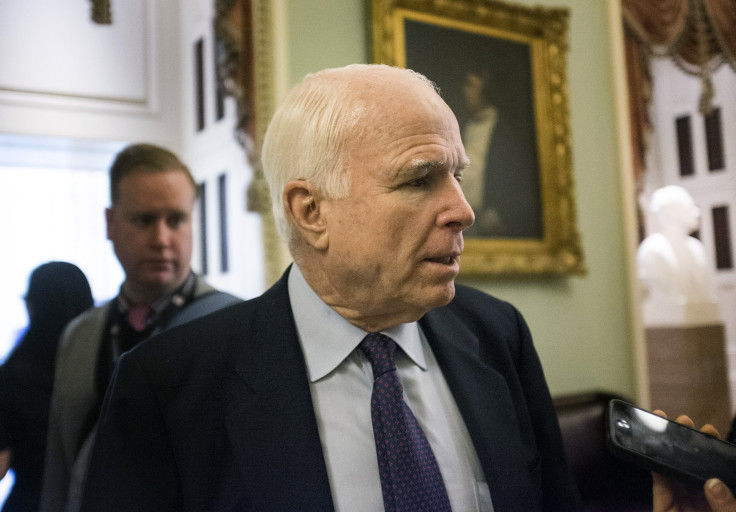Arizona-Mexico Border Patrol Bill And Mine Provoke Protests Against John McCain In Tucson

A small group of protesters took to the streets outside of Sen. John McCain’s Tucson, Arizona, office on Wednesday, banging drums and decrying two of the senator’s recent actions in Washington that affect the borderlands and Native American reservations. There were about 70 to 75 protesters, all members of environmental and tribal rights groups.
One focus of the protest was a bill introduced in March by McCain and Arizona Rep. Matt Salmon that would free up U.S. Customs and Border Protection personnel from the need to request federal permissions to access land that is otherwise protected. The other focus was a provision that Senator McCain added to a defense appropriations bill in December that traded away sacred Native American tribal land in the Tanto National Forest to build a copper mine. The company building the mine is Rio Tinto, which also owns a uranium mine with Iran in Namibia.
“Those lands are on the Tonto National Forest, so they belong to all Americans,” said Randy Serraglio, the Southwest Conservation Advocate for the Center for Biological Diversity, which attended the protests and advocates for the protection of endangered species. “It’s a very popular recreation site, but it’s also a sacred place to the Apache people.” The Tanto National Forest is found just to the northeast of Phoenix, Arizona.
#ShameonMcCain protest happening in downtown #Tucson pic.twitter.com/QZt9tNe6fa
— KVOA News 4 Tucson (@KVOA) June 3, 2015Protest in front of Sen. John McCain's Tucson office in downtown. The group is protesting Senate Bill 750. #Tucson pic.twitter.com/IuYCnRbGrd
— Kevin Adger (@K_Adger_TNN) June 3, 2015Protesters on Wednesday went on a quarter-mile march before stopping in front of McCain’s office. Wendsler Nosie, a member of the San Carlos Apache Tribe, said protesters were drumming along the way and getting supportive honks from passing cars.“That’s the great thing because it just tells you that people are aware and people are supportive of the protesting that is taking place,” he said.
The bill introduced this year would allow the Border Patrol to bypass other agencies that might otherwise restrict access to the land to protect the environment in Arizona. With freer access to those lands, the Border Patrol would be able to install surveillance more easily and use motorized vehicles on patrol more often. Environmental groups are concerned that, while they see the current balance between Border Patrol and other agencies as a working solution that protects both the border and the environment in southern Arizona, the McCain bill would let border agents do whatever they want.
“There are a lot of things that are really egregious about that. No. 1, people here in Arizona deserve the same protection under the law as people anywhere else in the United States. These laws are just as important as they are to people in Delaware or anywhere in the U.S.,” Serraglio said. “No . 2, the Border Patrol has said that they don’t need this authority.”
In a statement provided to the International Business Times, McCain defended his record. “I am very proud of the my successful efforts to advance the Resolution Copper mine project, which will create thousands of jobs and billions in economic activity in one of the most economically-depressed areas of our state. The land exchange, which passed the Congress with broad bipartisan support, was a compromise that addresses many of the concerns raised by both environmentalists and Native Americans," he said. “I am also proud of legislation I introduced earlier this year to get the federal government out of the way of Border Patrol agents working every day to secure our border. I have long advocated for common-sense, humane immigration reform, but that has always been predicated on securing our border once and for all. This legislation would cut unnecessary red tape and enable Border Patrol agents to have access to all federally managed land in Southwest Arizona so they can perform their jobs effectively and keep our communities safe.”
The bill, after a somewhat testy ride through the Senate Homeland Security Committee, is now awaiting a vote in the full Senate.
© Copyright IBTimes 2024. All rights reserved.






















